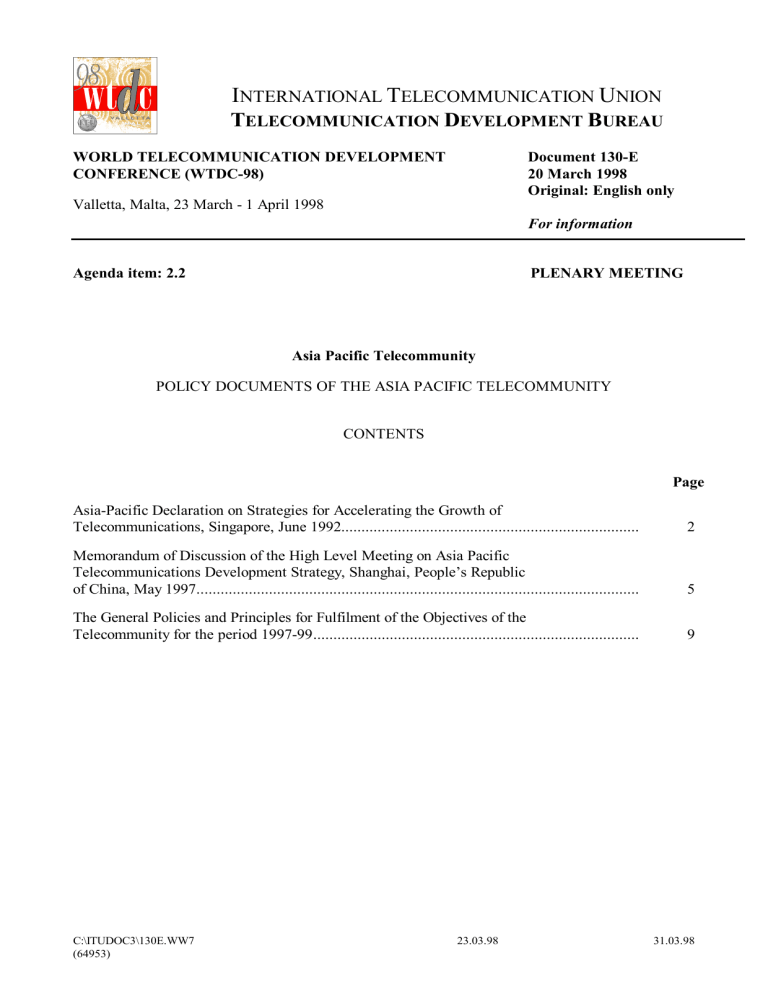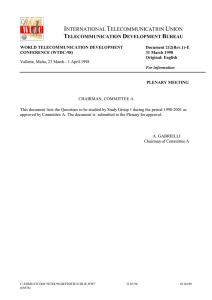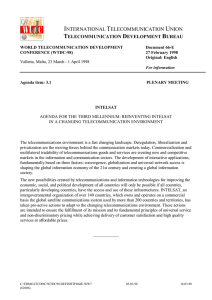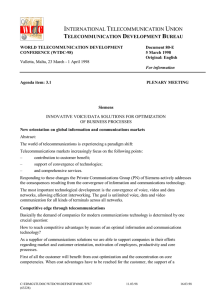I T U D

I
NTERNATIONAL
T
ELECOMMUNICATION
U
NION
T
ELECOMMUNICATION
D
EVELOPMENT
B
UREAU
WORLD TELECOMMUNICATION DEVELOPMENT
CONFERENCE (WTDC-98)
Valletta, Malta, 23 March - 1 April 1998
Document 130-E
20 March 1998
Original: English only
For information
Agenda item: 2.2
PLENARY MEETING
Asia Pacific Telecommunity
POLICY DOCUMENTS OF THE ASIA PACIFIC TELECOMMUNITY
CONTENTS
Asia-Pacific Declaration on Strategies for Accelerating the Growth of
Telecommunications, Singapore, June 1992..........................................................................
Memorandum of Discussion of the High Level Meeting on Asia Pacific
Telecommunications Development Strategy, Shanghai, People’s Republic of China, May 1997..............................................................................................................
The General Policies and Principles for Fulfilment of the Objectives of the
Telecommunity for the period 1997-99.................................................................................
Page
2
5
9
C:\ITUDOC3\130E.WW7
(64953)
23.03.98
31.03.98
- 2 -
CMDT98/130-E
ASIA-PACIFIC DECLARATION ON STRATEGIES FOR ACCELERATING THE
GROWTH OF TELECOMMUNICATIONS
1 Introduction
1.1
Although telecommunications has already been recognized as an important infrastructure for economic development, many countries of the Asia-Pacific region are struggling to provide even the basic services within easy reach of the people. Growth of telecommunications in developing countries of the region has suffered due to the low priority allotted to the sector and inadequate investment made in the past. The sudden spurt in demand for reliable telecommunication services at affordable prices has placed enormous strain on the scarce resources of the developing countries in the region. shortage of funds - more seriously that of hard currency - and lack of technological and human resources are some of the other factors affecting the growth of telecommunications in the region. It has become essential that all sectors involved in or benefited by telecommunications make coordinated efforts to meet these challenges.
1.2
Strategies for accelerating the growth of telecommunications involve policy decisions on the restructuring of the telecommunication sector, planning and implementation of domestic, subregional and regional networks, financing telecommunications development and strengthening regional cooperation in matters relating to network development, introduction of new services, transfer of technology, promotion of international standards, setting up of accredited acceptance testing centres, development of human resources, and promotion of trade in equipment and services.
Organizations like the Asia-Pacific Telecommunity (APT) and International Telecommunication
Union (ITU) have a leading role to play in these matters.
1.3
The benefits of advances made in several areas of telecommunications technologies such as
Optical Fibre, Satellite Communications, Mobile and Personal Communications etc. can be assisted through a mechanism of closer regional cooperation.
2 Actions urged
2.1
General
The governments of the countries and territories of the Asia-Pacific region should:
•
•
• recognize the importance of telecommunication development in facilitating economic and trade growth throughout the Asia-Pacific region; give higher priority to the development of the telecommunications sector in their national plans and endeavour to promote policies that will facilitate raising funds for the development of telecommunications; where possible seek solutions to network expansion, particularly in rural areas, that lead to self-sustaining growth in their telecommunications sector;
•
• restructure their telecommunication sector to make it more efficient and responsive to market forces according to the economic conditions in their own country; strengthen mechanisms of regional and sub-regional cooperation through existing organizations such as the APT and ITU aimed at exploring the potential for the development of solutions on a regional basis;
C:\ITUDOC3\130E.WW7
(64953)
23.03.98
31.03.98
•
- 3 -
CMDT98/130-E request the UNDP, the World Bank, the Asian Development Bank and other funding organizations to allocate a higher priority to the funding of the telecommunication sector.
2.2
Restructuring of telecommunications sector
Depending upon socio-economic conditions existing in the country, telecommunication administrations in the Asia-Pacific region should:
• promote restructuring of their telecommunication sector to make it more responsive to the market and infrastructural needs of the society;
• consider separating the responsibility for policy formulation and regulation from the delivery of services;
• depending upon the status of telecommunications in the country, carry out further deregulation to foster participation of the private sector in the telecommunication market.
2.3
Network development
Where appropriate, telecommunication administrations should:
•
• provide at least the basic telephone services within easy reach of the people; review the status of their existing networks with special regard to quality of service, traffic congestion, utilization of existing capacity and projected requirements for the decade;
•
•
• consider the preparation of regional and sub-regional projects to meet the traffic and service requirements of the future; discuss these proposals and implementation plans in coordination meetings with concerned organizations; develop regional cooperation in improving the quality of networks through appropriate installation practices, acceptance testing procedures, service standards, maintenance programmes and upgradation schemes.
2.4
Financing telecommunication development
Administrations of the Asia-Pacific region are urged to accord a higher priority to the telecommunication sector and endeavour to promote policies that will facilitate raising funds for the development of telecommunications including the consideration of setting up of an Asia-Pacific
Telecommunications Fund.
Telecommunication administrations of the Asia-Pacific region are requested to:
• generate internal resources by achieving revenue growth through increased business efficiency and cost-reductions;
• mobilize funds generated through efficient customer charging arrangements for promoting telecommunications development;
• within the framework of their national telecommunications policy, encourage innovative financing arrangements, including where appropriate, joint ventures, foreign participation,
BOT, revenue sharing and other schemes as a means of financing telecommunications developments.
C:\ITUDOC3\130E.WW7
(64953)
23.03.98
31.03.98
- 4 -
CMDT98/130-E
Regional cooperation in telecommunications 3
3.1
Introduction of new technologies and services in the region
Telecommunication administrations should encourage regional telecommunication organizations including the APT to strengthen their usual activities to promote the exchange of information among member countries concerning the introduction of new services and technologies. These activities include cooperation in regional planning and implementation, utilization of frequency spectrum, and geostationary satellite orbits, acceptance testing of systems, new technology applications, maintenance support etc.
Regional organizations like the APT are requested to promote agreements on matters concerning policy and regulatory aspects, liberalization of telecommunication services and inter country operations, tariffs etc.
3.2
Promoting transfer of technology in the region
Telecommunication administrations in the region are requested to take effective steps in association with other concerned organizations/departments in their countries to promote the development of cost effective technologies to suit their local needs.
Organizations such as the APT and the ITU have a leading role to play in promoting the transfer of telecommunication technology in the region. This will involve on-going assessment of the requirements of administrations, identifying possible areas of cooperation, providing assistance in the implementation of plans concerning transfer of technology, and coordination with the other concerned organizations and administrations.
3.3
Promoting international standards
APT in association with ITU, and concerned regional organizations is urged to take necessary steps in developing, adapting and promoting international standards in the region, and in particular, to promote regional cooperation and coordination on type approval, acceptance testing and standardization matters.
3.4
Development of human resources
Organizations such as APT and ITU have an important role to play in assisting with the training and development needs of member countries in the region.
These organizations at regional level should also take steps to strengthen regional cooperation in utilizing the collective resources of the region to fulfill training needs of individual countries and where appropriate encourage the setting up of regional training centres to meet the various training needs, such as production technology.
Telecommunication administrations in the region should pay particular attention to future human resource development needs, and should take practical steps to identify any areas where they will need assistance.
C:\ITUDOC3\130E.WW7
(64953)
23.03.98
31.03.98
- 5 -
CMDT98/130-E
HIGH LEVEL MEETING ON
ASIA PACIFIC TELECOMMUNICATIONS DEVELOPMENT STRATEGY
7-9 MAY, 1997; SHANGHAI, PEOPLE’S REPUBLIC OF CHINA
MEMORANDUM OF DISCUSSION
1 A High Level Meeting on Asia Pacific Telecommunications Development Strategy was held from 7-9 May in Shanghai, People’s Republic of China. The Meeting was attended by Ministers,
Vice Ministers, High level officials of APT Member countries, Affiliate Members of APT, top executives from the private sector, representatives of international organizations and others.
2 The meeting exchanged views on the various issues concerning telecommunications development strategies and recognized the work being done by APT in accelerating the development of telecommunications in the Asia Pacific region. The meeting referred to the following important documents concerning the subject:
• Asia Pacific Declaration on Strategies for Accelerating the Growth of Telecommunications adopted at the APT Meeting of Ministers in charge of Telecommunications, Singapore,
1-2 June, 1992.
•
•
The General Policies and Principles for fulfilment of Objectives of the Telecommunity for the period 1997-99.
The meeting concluded that the contents of these documents provide very useful directions for:
– developing the strategies for accelerating the growth of telecommunications in the Asia
Pacific region, and
•
– refining the scope and strategic direction of APT activities for meeting the objectives of
APT.
The meeting agreed that in spite of substantial development of the telecommunications sector, wide disparities in the development of telecommunications continue to exist in terms of quantity, quality and variety of telecommunications networks and services among APT
Members. A vast area of rural population still does not have access to reliable telecommunications facilities.
•
•
•
•
3 Currently, some significant changes are taking place in the telecommunications sector throughout the world. These include: increasing globalization; ongoing liberalization;
• rapid technological advancements; enhanced role of telecommunications including computer communications and enlarging its applications; increased role of private sector in network and service provision.
The discussions in the meeting centred around these topics.
C:\ITUDOC3\130E.WW7
(64953)
23.03.98
31.03.98
- 6 -
CMDT98/130-E
4 Impact of globalization and technology development: key policy issues
4.1
Globalization of telecommunications and rapid technological developments have made it imperative for the developing countries to adopt appropriate policies for accelerating the growth of telecommunications in their respective countries. Recently there has been a significant change in the technological scenario. Convergence of telecommunications, broadcasting and computer technologies has created a powerful multimedia environment. It is necessary to make appropriate policy orientations for harnessing the enormous potential of the multimedia. An essential requirement in this context is to maintain practicability and flexibility.
These technological developments have also opened up the possibility of offering a whole new range of services to the customers for meeting their demands. Recently there have been significant developments like growth of information infrastructure, satellite based personal communications systems, internet, intranet etc.
APT Member countries should endeavour to develop and attain their own technology base which will ultimately bring mutual prosperity in the region.
Providing basic telecom facilities to rural and under-served areas is on a high priority for many developing countries of the region. New technologies can also be effectively utilized for facilitating access to the rural and under-served areas.
It is recommended that:
• APT Members should urgently formulate their national information infrastructure policy. The policy should clearly address regulatory, technical, funding, utilization and social aspects of multimedia applications. Private sector has to be encouraged to harness and fully utilize the fruits of technological development.
•
•
APT should make all possible efforts to disseminate information on new technologies and related issues and discuss common interests and the concerned issues for transfer, adoption and utilization of new technologies in a harmonious manner.
In the regional context, a coordinated approach is necessary for projecting the harmonized views of the region in the global fora where the concerned issues are discussed and decisions are made for global application. APT should continue to play a leading role in this matter.
•
•
APT should encourage technical cooperation among its Members for enhancing their technological capability.
APT Members should continue to allocate a high priority for providing telecommunication facilities to under-served areas. Utilization of cost effective modern technologies should be encouraged for providing services. APT countries should seriously consider provision of telematic services and development of integrated network to rural areas.
4.2
Globalization of telecommunication calls for liberalization. Several countries of the region have taken practical steps to liberalize their telecommunication sector and in many countries, policy and regulatory matters have been separated from delivery of services. In addition to appropriate actions at the national level, collective action concerning various stages and aspects of liberalization is essential for achieving the impact of liberalization on the provision, quality and cost of services.
Several member countries of APT have entered into bilateral, regional and global agreements concerning trade in telecommunications. Bilateral and regional efforts must complement multilateral efforts to achieve trade liberalization. Furthermore, considerable follow up action is
C:\ITUDOC3\130E.WW7
(64953)
23.03.98
31.03.98
- 7 -
CMDT98/130-E required to translate these agreements into practical realities. Liberalization is an ongoing process and it is incomplete if it is not collective.
•
•
•
•
Members countries of APT are encouraged to:
• consider, under the situation and conditions concerned and within the requirements of the country, adopting appropriate measures leading to a time table for liberalization and private sector participation;
• exchange views on liberalization of telecommunications sector among the various players involved at the national level and take appropriate follow up actions
• take joint action and maintain continuity of dialogue among countries of the region for successful implementation of the decisions taken.
As decided by the 7 th
session of the APT General Assembly, in order to cope with the rapid changes taking place in the telecommunications sector, APT activities should cover the following broad areas:
Policy Issues
Technology Enhancement
Development of Telecommunications
Inter-regional and Intra-regional Cooperation
Based upon this, APT should prepare a policy document on “Telecommunication
Development Strategy for Asia Pacific Region in the 21 st
Century” and submit it through the appropriate APT forum for review.
5 Competitive business environment
5.1
In order to accelerate the growth of telecommunications, it is essential to build a competitive business environment. Such an environment can be created by promoting mutual trust and cooperation among various players of the game. Statement of clear objectives, non-discrimination, transparency and fairness are key features of a successful business policy. Many countries have already promulgated appropriate investment policies and they revisit these policies periodically.
Member countries of APT should:
•
• exchange more information and experiences in a competitive business environment at national level; conduct regular dialogue with business sector at national and regional levels for nourishing a competitive business environment which is the key to the growth of telecommunications.
APT should organize a colloquium in 1998 for business and government representatives to discuss the various issues involved and actions to be taken for promoting competitive environment with optimum benefits for the countries of the region.
6 Multimedia networks
Developments in Multimedia have opened up enormous potential for bringing efficiency in government, business and social activities. Conventional networks will gradually give way to high speed multipurpose networks and the speed of business transactions will be much faster.
C:\ITUDOC3\130E.WW7
(64953)
23.03.98
31.03.98
- 8 -
CMDT98/130-E
Establishment of Information Infrastructure will dramatically transform the work culture and the style of conducting business. Successful development and optimum utilization of these networks will depend heavily upon our ability to attract investments and our skill to manage the operation of these new networks. Close cooperation and effective coordination can narrow the gap between information haves and information have-nots. A stronger focus on Human Resource Development will be needed.
Member countries of APT should:
• enhance cooperation at national and regional level for promoting multimedia applications by sharing experience and expertise on technological and application aspects on the concerned subject.
• support the APT in facilitating activities concerning establishment of Asia Pacific
Information Infrastructure by conducting pilot trials, implementing test bed projects, developing human resources in the hi-tech area and other activities.
• encourage the development of intra-regional, inter-regional connectivity and enhance regional collaboration in developing cost-effective broadband networks.
7 New technologies and new services
Introduction of new technology and new services is an ongoing process. All services internationally available will need to be introduced in the Member countries of APT. These new services will also be expanded to neighbouring countries.
On the other hand, introduction of new services also raises some issues which need to be handled very carefully. Concern has been raised in various fora about call back activities. Depending upon the situation in each country call back can create various technical, financial and legal problems Illegal resale, reform of the accounting rates, frauds are other issues need to be studied and deliberated upon in depth. Most of these issues have to be addressed in a coordinated manner.
APT should:
•
• assist Members in taking advantage of New Technologies and Services; encourage healthy development of business environment for introduction and expansion of new services in the Asia Pacific region.
8 Accounting rate
Accounting rate is an important issue for APT Members. In this context, the agreed principles of cost oriented accounting as recommended by ITU need to be followed. Any outstanding issues should be settled on a bilateral or multilateral basis.
• APT should urgently organize a meeting to address the issues like call back, resale, reform of the accounting rate systems, frauds etc. in the specific context of the Asia
Pacific region with particular reference to the special problems of developing countries etc. This meeting should be coordinated with relevant ITU activities.
9 Thanks
The Executive Director, APT thanked the dignitaries for their active participation in the Meeting and invited them to send their views and proposals to the APT secretariat on items of common interest including issues of their concern for further action by the Secretariat.
C:\ITUDOC3\130E.WW7
(64953)
23.03.98
31.03.98
- 9 -
CMDT98/130-E



